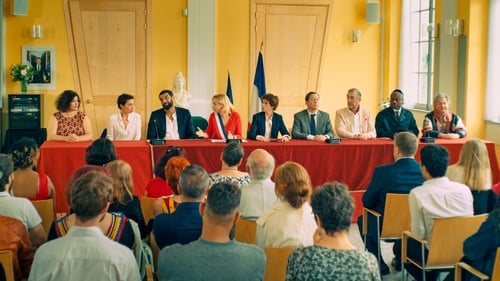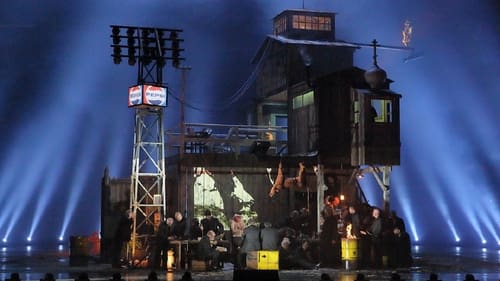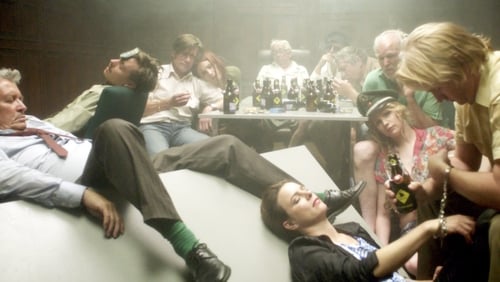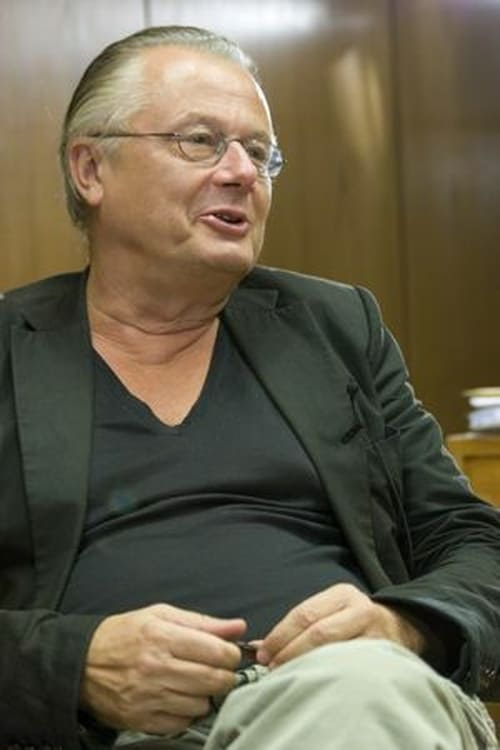Frank Castorf
출생 : 1951-07-17, Berlin, Germany
약력
Frank Castorf is a German actor, writer, stage and film director and since 1992 the artistic director of the Volksbühne am Rosa-Luxemburg-Platz. His work is often associated with postdramatic theatre.

The story revolves around Joëlle and Kamel Mrabti, key members of staff for Montfermeil's new mayor, Emmanuelle Joly—but the couple is also in the process of divorcing. The whole staff is working together on the implementation of a wacky new policy that features the creation of the Montfermeil Intensive School of Languages, where seven of the 62 languages spoken in this town on the outskirts of Paris will be taught. The policy is a great success and effectively revitalises the town, but life is no less complicated for the mayor's staff. Joëlle and Kamel are at war with each other and are each in love with mysterious blind dates. Shadowy traitors in the administration are seeking to sabotage Ms Joly's good work. Suspicions fall on Kamel.

Adaptation
Frank Castorf has adapted Racine and combined this material with texts by Artaud. His art of theatrical and vital immoderation explores how, when it comes to this classical French author, the tragedy of existence is born from collusions between private passions and power.

Director
Frank Castorf has adapted Racine and combined this material with texts by Artaud. His art of theatrical and vital immoderation explores how, when it comes to this classical French author, the tragedy of existence is born from collusions between private passions and power.

Self
For a quarter of a century, Frank Castorf has created a microcosm in the Volksbühne that many considered to be an identity-forming fortress and a renegade island in the increasingly chic and monotonous centre of the capital. The marathon productions for which he was responsible were true orgies of association that demanded everything from the audience. The film accompanies Castorf's final season and is there when the theatre people get together once more to start a last fireworks display in the face of an uncertain future. (weltfilm GmbH)

Stage Director
Stage director Frank Castorf “might have been born to direct From the House of the Dead” (Opera Today). His gritty, visually striking adaptation brings bold modern and postmodern touches to Janáček’s masterwork without ever overshadowing the intense forward momentum of the music, conducted to dramatic perfection by Simone Young and sung by an all-star cast in Munich. Janáček adapted Dostoevsky for this powerfully compelling opera set in a Siberian prison camp, full of starkly contrasting moods and motifs, unusual in its episodic structure. The last opera Janáček ever composed, its third act was on his desk when he died in 1928; attempts by his students to “complete” his orchestration have largely fallen away over the decades in favor of the original version. Despite the grimness of the setting and the brutality of several characters, the composer’s compassion shines through in tender moments, movingly illustrating his motto for the work: “in every creature, a spark of God.”

Volksbühne am Rosa-Luxemburg-Platz 1992-2017. The end of the GDR gave rise to new artistic freedoms in reunited Berlin. Shortly after the fall of the Wall, rebel director Frank Castorf was appointed artistic director of the Volksbühne. His way of working altered the public’s perception of this theater. The chronological history of the Castorf era between 1992 and 2017 is told here in excerpts from the productions and in a series of conversations conducted on the long sofa in the theater's foyer.

Director
Frank Castorf’s staging of the Ring, premiered in 2013 and filmed in 2016, provoked controversy right from the beginning. For Castorf, the Rheingold of our days is oil; thus he places the first part of the tetralogy at a gas station on Route 66. Die Walküre is situated in Baku, Azerbaijan, which was seized by the Bolsheviks in 1920 for its oil, whereas Siegfried takes place in a socialist equivalent of Mount Rushmore and at Berlin’s Alexanderplatz. Götterdämmerung is set somewhere in the GDR, ending up at New York’s stock exchange. Whilst Castorf’s staging polarized, Marek Janowski’s musical reading was unanimously praised, as was the excellent cast including in this opera Iain Paterson (Wotan), Nadine Weissmann (Erda), Albert Dohmen (Alberich) and Roberto Saccà (Loge).

Director
Frank Castorf’s staging of the Ring, premiered in 2013 and filmed in 2016, provoked controversy right from the beginning. For Castorf, the Rheingold of our days is oil; thus he places the first part of the tetralogy at a gas station on Route 66. Die Walküre is situated in Baku, Azerbaijan, which was seized by the Bolsheviks in 1920 for its oil, whereas Siegfried takes place in a socialist equivalent of Mount Rushmore and at Berlin’s Alexanderplatz. Götterdämmerung is set somewhere in the GDR, ending up at New York’s stock exchange. Whilst Castorf’s staging polarized, Marek Janowski’s musical reading was unanimously praised, as was the excellent cast including in this opera Iain Paterson (Wotan), Nadine Weissmann (Erda), Albert Dohmen (Alberich) and Roberto Saccà (Loge).

Director
Frank Castorf’s staging of the Ring, premiered in 2013 and filmed in 2016, provoked controversy right from the beginning. For Castorf, the Rheingold of our days is oil; thus he places the first part of the tetralogy at a gas station on Route 66. Die Walküre is situated in Baku, Azerbaijan, which was seized by the Bolsheviks in 1920 for its oil, whereas Siegfried takes place in a socialist equivalent of Mount Rushmore and at Berlin’s Alexanderplatz. Götterdämmerung is set somewhere in the GDR, ending up at New York’s stock exchange. Whilst Castorf’s staging polarized, Marek Janowski’s musical reading was unanimously praised, as was the excellent cast including in this opera Iain Paterson (Wotan), Nadine Weissmann (Erda), Albert Dohmen (Alberich) and Roberto Saccà (Loge)

Director
Frank Castorf’s staging of the Ring, premiered in 2013 and filmed in 2016, provoked controversy right from the beginning. For Castorf, the Rheingold of our days is oil; thus he places the first part of the tetralogy at a gas station on Route 66. Die Walküre is situated in Baku, Azerbaijan, which was seized by the Bolsheviks in 1920 for its oil, whereas Siegfried takes place in a socialist equivalent of Mount Rushmore and at Berlin’s Alexanderplatz. Götterdämmerung is set somewhere in the GDR, ending up at New York’s stock exchange. Whilst Castorf’s staging polarized, Marek Janowski’s musical reading was unanimously praised, as was the excellent cast including in this opera Iain Paterson (Wotan), Nadine Weissmann (Erda), Albert Dohmen (Alberich) and Roberto Saccà (Loge).

Stage Director
Frank Castorf’s staging of the Ring, premiered in 2013 and filmed in 2016, provoked controversy right from the beginning. For Castorf, the Rheingold of our days is oil; thus he places the first part of the tetralogy at a gas station on Route 66. Die Walküre is situated in Baku, Azerbaijan, which was seized by the Bolsheviks in 1920 for its oil, whereas Siegfried takes place in a socialist equivalent of Mount Rushmore and at Berlin’s Alexanderplatz. Götterdämmerung is set somewhere in the GDR, ending up at New York’s stock exchange. Whilst Castorf’s staging polarized, Marek Janowski’s musical reading was unanimously praised, as was the excellent cast including in this opera Iain Paterson (Wotan), Nadine Weissmann (Erda), Albert Dohmen (Alberich) and Roberto Saccà (Loge).

Frank Konopke
A lifeguard at Lake Müggel has his hand bitten off and the marks indicate a shark attack. The lake is closed to the public by extending a local festival indefinitely while the city council thinks of what can be done to remove the shark. The public becomes restless having their lake closed for so long and come up with a plan to drive the shark from the lake with large quantities of beer.

Screenplay
Unites grotesque elements, tempo, quiet dream sequences, the thrill of a detective story, but above all, he manages to capture the temperature of an actor ensemble that throws itself into the world of Dostoyevsky with immense pleasure and passion.

Director
Unites grotesque elements, tempo, quiet dream sequences, the thrill of a detective story, but above all, he manages to capture the temperature of an actor ensemble that throws itself into the world of Dostoyevsky with immense pleasure and passion.

The capital Berlin is heavily in debt. Annually it takes 16 billion euros, but gives out 20 billion. The minus is covered by loans, which in turn attract interest.

Writer
In the last house just behind the western borders of Russia, between Paris/Texas and Korleput/Mecklenburg-Vorpommern, Cindy Sherman, Dogma 95 and Duma 2000, Frank Castorf directs his virst video production "Dämonen" ("Demons") as a sort of post-Soviet-panslavistic panopticon in his own dramaturgy based on Dostojewski's "Demons" and Camus' "The Posessed". All that in set designer Bert Neumann's industrial-designed bungalow (with swimming pool) built onto forbidding landscape.

Director
In the last house just behind the western borders of Russia, between Paris/Texas and Korleput/Mecklenburg-Vorpommern, Cindy Sherman, Dogma 95 and Duma 2000, Frank Castorf directs his virst video production "Dämonen" ("Demons") as a sort of post-Soviet-panslavistic panopticon in his own dramaturgy based on Dostojewski's "Demons" and Camus' "The Posessed". All that in set designer Bert Neumann's industrial-designed bungalow (with swimming pool) built onto forbidding landscape.

Writer
A political drama about the assassination of a leading politician. When Hugo comes out of jail, the Communist party has embarrassingly swung in a new direction, namely Hoederer's line. Now Hugo must die.

Director
A political drama about the assassination of a leading politician. When Hugo comes out of jail, the Communist party has embarrassingly swung in a new direction, namely Hoederer's line. Now Hugo must die.

Screenplay
"The Devil's General" - A post war Germany pick up the involuntarily knowledge about the "black hole" of the 1950s.

Director
"The Devil's General" - A post war Germany pick up the involuntarily knowledge about the "black hole" of the 1950s.

Director





